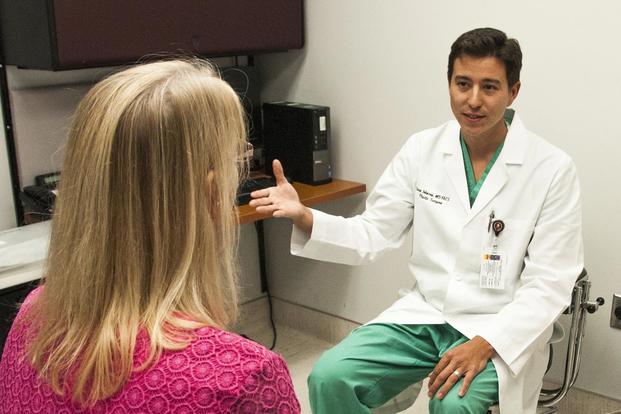Active-duty female troops experience infertility at rates three times that of civilian American women, and they continue struggling with fertility problems after leaving the service, according to a new survey by the Service Women's Action Network, an advocacy group for female veterans.
According to the report, Access To Reproductive Health Care: The Experiences of Military Women, 37 percent of active duty women polled said they had chronic problems in conceiving or carrying a baby to term, while 30 percent of female veterans said they experienced infertility while trying to get pregnant.
The rate of infertility among civilian U.S. women is 12 percent, according to the Centers for Disease Control and Prevention.
The enormous disparity may be an indication that the problem is service-connected, retired Army Col. Ellen Haring, chief executive officer at SWAN, said. "The military needs to determine the reason for this high rate of infertility and immediately provide military women all forms of infertility care at no cost," she said.
Female service members make up roughly 17 percent of the armed forces while 10 percent of veterans are women, according to data from the Departments of Defense and Veterans Affairs.
For its report, SWAN polled service women and veterans online, receiving responses from 799 military women. Thirty five percent of respondents were active duty, while nearly 60 percent were veterans or retirees.
The survey did not determine why female troops and veterans experienced infertility at high rates. But in follow-up interviews, some said environmental exposures on the job, including contaminated water and poor air quality, as well as fuels and other chemicals, may be to blame.
"This data clearly cries out for more research by the military, but in the interim, military women whose infertility is likely linked to military service should be afforded access to all available infertility diagnosis and treatments at no cost," the report noted.
In other findings, nearly all active duty survey respondents said they had access to birth control and few reported unintended pregnancies. Of the 13 percent who said they became pregnant when they didn't want to be, more than half were using birth control at the time.
Among the veteran population, 31 percent said they had an unintended pregnancy while on active duty and 11 percent said they had one following military service.
A total of eight active duty women reported having abortions while serving, while 50 veterans said they terminated pregnancies by abortion. The cost of the procedure, roughly $300-$600, is not covered by the DoD or VA.
The report did not advocate for abortion services to be provided by the federal government. Instead, SWAN recommended that military and veteran health providers provide advice, support and aftercare.
"Although military and veteran health care providers cannot provide abortions themselves, they could advise military women on where to get them and they should certainly provide follow-up care," Haring said in a statement accompanying the report.
Five military treatment facilities provide fertility services: Brooke Army Medical Center, San Antonio, Texas; Tripler Army Medical Center, Hawaii; Walter Reed National Military Medical Center, Bethesda, Maryland; Naval Medical Center San Diego, California; and Madigan Army Medical Center, Tacoma, Washington.
Tricare covers some, but not all of the costs associated with in-vitro fertilization in areas where the services aren't offered through a military treatment facility.
For veterans, care is offered if the fertility issues are considered service related, but women often find it difficult to prove that connection, the report noted.
SWAN, a Washington, D.C. based advocacy group for women veterans, made several recommendations based in the survey findings. The recommendations included that DoD and VA: conduct research to determine the source of female troops' infertility; provide more treatment options for infertility; and provide post-abortion care as well as information on civilian abortion services.
-- Patricia Kime can be reached at patriciankime@gmail.com. Follow her on Twitter @patriciakime.













